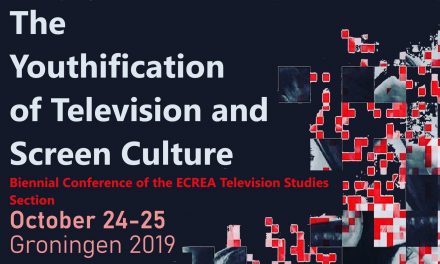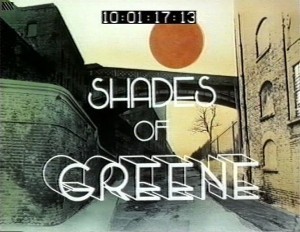Let me come out, here, once and for all. I actually like international football. It’s interesting in a jokey kind of way. There’s some skill involved, and a good goal can take your breath away. I also like it because for most of the time it’s dead boring and you can talk to your mates. In other words, watching football remains one of the few occasions in our daily television consumption when talking over the TV is still considered normal and, perhaps more importantly, utterly acceptable. Judging from my partner’s recent experience of being an audience member, it’s also still an occasion when you are allowed to scream and shout at the telly. That’s real social TV. The kind of TV I live for.
I also don’t subscribe to the sheer notion, as some of my friends and family do, of a ‘football free zone’. Often, their pride in living without football is based on a particular perception of the relationship between working-class masculinity, football and violence. In contrast, I understand this relationship in line with an alternative discourse which highlights that football provides the opportunity for the working classes to subvert the rules and power games of the elite. I am, perhaps inevitably, invested in such a discourse because of my own imagined connections to such a history and identity.
But this year I have decided to utterly and completely avoid watching the World Cup. The reasons are manifold, but betray quite a number of changes in my life, some of which are private and some of which are very public. But even the private ones speak to public concerns, which is why I will admit to them at some point – though not today. In the meantime, let me focus on that very public concern that makes me avoid the World Cup, which is my political identity as European migrant in a country which elected 7 members of UKIP to be their representatives in the recent European Parliamentary Elections.

In one of the recent CST-ECREA blogs, Katerina Serafeim highlighted how Greek television had been instrumental in deciding who was elected to be their MEPs. There is no question that British television, too, has to consider its willingness to continually report UKIP’s point of view while largely ignoring that of other, small(ish) parties. Of course, the emotional response triggered by a deeply populist party with a charismatic leader who also continuously offer themselves up to charges of homophobia, racism and fascist tendencies is likely to appeal to a medium that still aims to attract as large an audience as possible. Nevertheless, to quote Serafeim, ‘it is us… who choose the “products” of the low-level media environment.’ In other words, the responsibility lies with us. That means I don’t (entirely) blame television for ruining my football experience. As a result, I also don’t want to spend the rest of this blog looking at how television represents football and nation or indeed perpetuates ideas of a ‘football nation’,[1] but rather how my personal circumstances (which are also national, cultural and social) affect my television consumption. You can interpret this as an attempt to relate my experience of being a shopkeeper who is forced to watch Nationwide.
There are several things at stake here, then, and each one needs a bit of explanation. Let’s start with football’s relationship to national pride. As Koen Stroegen (2002) highlights, this might be more complex than at first seems. Of course, football has caught the attention of cultural scholars because of ‘the contrasting styles of play national teams have managed to sustain over the generations’ (ibid.: 10), indicating how discourses (in the proper Foucauldian sense) of national stereotype infiltrate assessment and potentially also construction of the game. But drawing on ideas of ritual (Bloch 1992), Stroegen highlights how the level of uncertainty and unpredictability incorporated in the game enables football to become a ‘credible replica of society’ (2002:9), which includes the working through of national belonging in a situation of victory or defeat. In a normal scenario, then, football allows ‘the spectator to experience their synchrony with the world’ (ibid.). Put differently, it allows audiences to connect emotionally to a team and nation, but see their patriotism in relation to the rest of the world.
But this year is not a normal scenario. Stroegen highlights how England, in the glory days of the Empire, were hesitant to join any international associations or take part in international tournaments, ‘perhaps presaging their hesitant approach to the European Union’ (ibid.: 11). This year, England did not hesitate to take part in the World Cup. Instead, they highlighted their isolationism in how they voted. How this looks to a marginal resident can only be explained by looking more closely at my particular identity.
I am European. My whole identity is defined by this thought: my European belonging allows me to live and work in this country without the hassle and intimidation of having to go through bureaucratic processes involving the Home Office. I can move freely from country to country, and when I go back to the Continent, I love the ability to move from country to country without having to show my passport. My European identity has facilitated my relationships, and enables me to draw on experiences from different countries that make me value the relatively progressive attitudes to gender, sexuality and race in the UK, and my ability to actually work in my profession rather than having to reinvent myself as a media or film scholar. When I go back to Germany, I feel I am British, when I am in the UK, I feel I am German. Being German by birth means that I have always subscribed to the European Union. In that respect I am not unusual, as Juan Diez Mendrano indicates. Much of this is connected to Germany’s ‘Euro-patriotism’ as Thomas Risse et al. call it. This unique form of patriotism is fed by Germany’s shame about its past and an attempt to overcome its former nationalism and militarism.
Britain, of course, has always been sceptical about Europe (ibid.) and has remained at the margins of many movements to integrate Europe further, including the European Monetary Union and the development of the Schengen Area (which allows you to travel without a passport). This is widely reflected in the reporting of Europe in the UK which highlights European bureaucracy or imagines Europe as an open door to everything ‘un-British’ (which often goes along with little-disguised racist remarks). But as Michael White rightly indicates, it is the failure of politicians to lead on the arguments about Europe rather than pander to populist opinion that has made the situation worse and created an environment where Euroscepticism seems to be met with very little criticism and hence has practically become common sense.

Within this context, national pride – and in particular English[2] national pride – has become much more problematic too. This is particularly true as a result of the fact that much of this Eurosceptic debate is being held on the level that UKIP provides; a level that does not seem to shy away from homophobia, sexism, and most of all racism. Indeed, this is the first time since I moved to the UK, nearly 12 years ago, that I feel uncomfortable and marginally threatened when someone asks me where my accent is from.
It is for these reasons that I am unwilling to watch the World Cup: too much of this game is tainted this year by white and red flags flying everywhere that remind me[3] of the discourses that are explicitly discriminatory. Perhaps I am more attuned to these discourses – like the shopkeepers in Morley’s study – because they explicitly exclude me (though probably many people wouldn’t want to exclude me, personally, from this country). But for the first time, the expression of national pride through football makes me feel uncomfortable because its particular language has become so completely colonised by the elite (which UKIP and of course the band-wagon-jumping Tories utterly represent) that the opportunity for an alternative, subversive discourse through football, which brings us, world citizens, all together, seems to have disappeared.
Elke Weissmann is Reader in Film and Television at Edge Hill University. She is currently considering changing this to Reader in Television and Film, however. Her books include Transnational Television Drama (Palgrave) and the edited collection Renewing Feminisms (I.B.Tauris) with Helen Thornham. She is vice-chair of the ECREA TV Studies Section and sits on the board of editors for Critical Studies in Television. She migrated to the UK in 2002 after realising that German television was as bad as she remembered.
[1] I would like to acknowledge that this point has been influenced by the feedback provided by David Leventes Palatinus.
[2] It is clear that Scotland, at least, is much more willing to embrace the European Union and would, in the case of a Yes vote in September, remain within the EU.
[3] I should emphasise that there’s nothing about the reporting of the World Cup itself, or indeed the behaviour of the fans, that makes me feel this way. On the contrary, there seems to be surprisingly little in the line of ‘the home of football’ and ‘Rule Britannia’ about this year’s game. What makes me feel this way is literally just the sight of the flags and anything else signifying nation.




